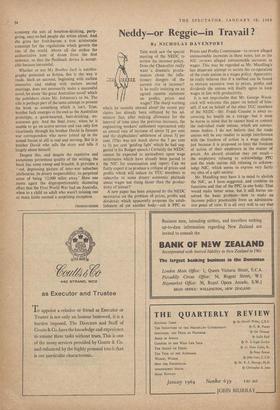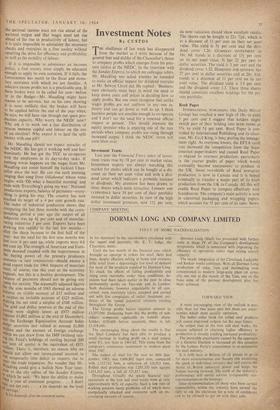Neddy—or Reggie in Travail ?
By NICHOLAS DAVENPORT THIS week saw the special meeting of the NEDC to review the incomes policy. Does the Chancellor really want a dramatic procla- mation about the infla- :U. a.KXZZ tionary dangers of the current rise in incomes? Is he really insisting on an agreed interim statement on profits, prices and wages? The sharp warning which he recently uttered about- the recent pay claims has already been softened by his ad- mission that, after making allowance for the interval of time since the previous increases, the engineering workers' settlement represented only an annual rate of increase of about 31 per cent and the shipbuilders' settlement of about 31• per cent. (This was not much above the 3 per cent to 3f per cent 'guiding light' which he had sug- gested in his Budget speech.) Certainly the NEDC cannot be expected to animadvert upon wage settlements which have already been passed to the NIC for examination and report. Can we fairly expect it to produce a critique of prices and profits which will induce its TUC members to subscribe to some dreary economic platitude about wages not rising faster than the produc- tivity of labour?
A new paper has been prepared by the NEDC secretariat on the problem of prices, profits and dividends which apparently proposes the estab- lishment of yet another body—call it PPC or Prices and Profits Commission—to review alleged unreasonable increases in these items, just as the NIC reviews alleged unreasonable increases in wages. This may be regarded as Mr. Maudling's last desperate attempt to secure the co-operation of the trade unions in a wages policy. Apparently he really believes that if a method can be found to restrain excessive rises in prices, profits and dividends the unions will finally agree to keep wages in line with productivity.
It is not improbable that Mr. George Wood- cock will welcome this paper on behalf of him- self, if not on behalf of the other TUC members of the NEDC—Mr. Frank Cousins is away re- covering his health on a voyage—but it must be borne in mind that he cannot bind or commit the individual trade unions, which are autono- mous bodies. I do not believe that the trade unions will be any readier to accept interference with the freedom of action in a wage dispute just because it is proposed to limit the freedom of action of their employers in the matter of prices. An absurd situation may yet result— the employers refusing to acknowledge PPC and the trade unions still refusing to acknow- ledge NIC, which seems to express very fairly my idea of a split society.
Mr. Maudling may have it in mind to abolish the NIC, as I have suggested, and combine its functions and that of the PPC in one body. That would make better sense, but it still leaves un- solved the basic problem—how to make an incomes policy practicable from an administra- tive point of view. It is all very well to say that the national income must not rise ahead of the national output and that wage's must not rise ahead of the rise in productivity of labour, but it is quite impossible to administer the necessary checks and restraints in a free society without upsetting the drive for efficiency and profitability as well as the mobility of labour.
If it is impossible to administer an incomes policy, a free society must simply be educated
enough to apply its own restraints. If it fails, the Government has resort to the fiscal and mone- tary restraints with which we are familiar. A
selective excess profits tax is a practicable step. If these brakes were to be called for now—before or in the Budget—Mr. Maudling might have reason to be nervous, but on his own showing it is most unlikely that the brakes will have to be applied before the end of the year when, he says, we will have run through our spare pro- duction capacity. Why worry the NEDC now? Why ask it to work out a fair distribution of returns between capital and labour on the eve of an election? Why expect it to heal the split society with one pill?
Mr. Maudling should not expect miracles of the NEDC. He has got it working well and har- moniously. He has got the TUC to co-operate with the employers in its day-to-day tasks. If nothing worse happens on the wages front Mr. Maudling can count himself the luckiest Chan- cellor since the war. He can rise each morning singing that song from Oklahoma! whose verse begins with 'Oh what a beautiful morning' and ends with 'Everything's going my way.' National production, exports, balance of payments—every- thing is going his way. The country has now reached its target of a 4 per cent growth rate. 1 he index of industrial production shows that comparing the last three months with the corre- sponding period a year ago the output of all industries was up 41 per cent and of manufac- turing industries 5 per cent. Exports have been growing less rapidly in the last few months— after the sharp increase in the first half of the Year--but the total for the first nine months was Jost over 6 per cent up, while imports were 4.6 Per cent up. The strength of American and Euro- Pean demand coupled with the improvement in the buying power of the primary producers overseas—a rare conjuncture—should ensure a good export trade for 1964. Imports of materials 'Must, of course, rise this year as the economy expands, but this is a healthy development. The balance of payments should not be giving any cause for anxiety. The seasonally adjusted figures for the nine months of 1963 showed an adverse balance on visible account of £17 million and a surplus on invisible account of £125 million, 'raking the net total a surplus of £108 million. The gold and dollar reserves at the end of this Period were slightly lower at £977 million (against £1,002 million at the end of December), but the Exchange Equalisation Account holds d it °..ar securities last valued at around 51,000 roillion and the amount of foreign exchange which we can draw from the IMF (without rais- rig the Fund's holdings of sterling beyond 200 Per cent of quota) is the equivalent of • £871 nlillion. There is, therefore, no reason why we should not allow our international account to -11 temporarily into deficit as imports rise to 111:1,eet the trade expansion. No wonder that Mr. Maudling could give a bullish New Year inter- to the city editor of the Sunday Express to which he said: 'We have the ability to make '"4 a year of consistent progress. -ie out tax cuts . . . a lot depends on the level 'f savings.'
A lot depends also on common sense.



































 Previous page
Previous page